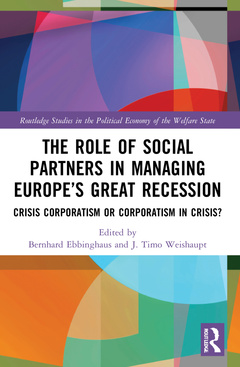Description
The Role of Social Partners in Managing Europe’s Great Recession
Crisis Corporatism or Corporatism in Crisis?
Routledge Studies in the Political Economy of the Welfare State Series
Coordinators: Ebbinghaus Bernhard, Weishaupt J. Timo
Language: English
Subject for The Role of Social Partners in Managing Europe’s Great...:
Keywords
Wahlalternative Arbeit Und Soziale Gerechtigkeit; corporatism; Monti Cabinet; unions; Social Concertation; employers; Social Partners; government policy; Gdp Growth; crisis management; IG Metall; macro-economic management; Social Pacts; European Union; Tripartite Concertation; EU; Financial Market Crash; Economic and Monetary Union; Social Partnership; EMU; Ursula Von Der Leyen; financial crisis; Tax Based Incomes Policy; Great Recession; Tripartite Social Dialogue; Concertation Efforts; Troika Intervention; Social Dialogue; Fuzzy Set QCA; Crisis Corporatism; STW; Social Partner Involvement; Rutte Ii; Social Partnership Process; EU Political System; Visser 2011b; European Semester
Publication date: 05-2023
· 15.6x23.4 cm · Paperback
Publication date: 07-2021
· 15.6x23.4 cm · Hardback
Description
/li>Contents
/li>Readership
/li>Biography
/li>
This comprehensive study of the Great Recession and its consequences provides comparative analyses of the extent to which social concertation between government, unions, and employers varied over time and across European countries.
This edited volume ? a collaboration of international country experts ? includes eight in-depth country case studies and analysis of European-level social dialogue. Further comparisons explore whether social concertation followed economic necessity, was dependent on political factors, or rather resulted from labour?s power resources. The importance of social partners? involvement is again evident during the Covid-19 pandemic.
Examining contemporary crises, the book will be of considerable interest to scholars and students of public and social policies, comparative political economy, and industrial relations ? and more broadly to those following European and EU politics.
Part 1:Concertation during times of crisis 1. Introduction: Studying social concertation in Europe 2. Social concertation in Europe during the Great Recession: Exploring when governments include social partners in crisis management Part 2: Preventing a crisis through pragmatic crisis management 3. Back to the future: Germany’s turn to neo-corporatism in times of crisis 4. Wage autonomy, political reforms and the absence of social pacts in Denmark 5. Crisis management in the Netherlands: Social concertation and constructive opposition 6. Unilateral crisis prevention and crumbling social partnership in Poland Part 3: The perils of concertation in austere crisis contexts 7. The rise and fall of Irish social partnership 8. The decline of social concertation or the crumbling pillars of legitimacy in Spain 9. A biased pendulum: Italy's oscillations between concertation and disintermediation 10. The crisis and the changing nature of political exchange in Slovenia Part 4: Crisis concertation in European perspective 11. Conflict or cooperation? Explaining the European Commission’s and social partners’ preferences for low-level social dialogue 12. Social concertation at a cross-road: crisis corporatism or corporatism in crisis? 13. Postscript: Social partnership facing the 2020 Coronavirus pandemic
Bernhard Ebbinghaus is Professor of Social Policy in the Department of Social Policy and Intervention, University of Oxford, UK.
J. Timo Weishaupt is Professor at the Institute of Sociology, University of Göttingen, Germany.




